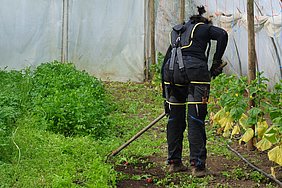Preliminary results of a pilot study indicate that it may be worth taking a closer look at the effect of this external support structures with regard to the stresses on the spine caused by heavy work in horticulture.
Work in horticulture often requires forced body postures. Working bent over is as much a part of everyday work as lifting and carrying heavy loads. This can trigger acute as well as chronic back pain with restricted mobility and degenerative spinal disorders. Passive exoskeletons, as already used to some extent in industry, could also help reduce the load on the spine in horticulture.
In a pilot study by ATB together with students from the Beuth University of Applied Sciences in Berlin, initial investigations on the use of exoskeletons were conducted. A quasi-experimental approach with a control group was used. Data collection was based on a usability acceptance questionnaire and observations. Two exoskeletons from the companies Herowear (Apex), USA, and Ergosante (Hapo), France, were tested (cost of these exoskeletons is currently around 1000 Euros each). The tests were carried out on a farm and at ATB's experimental site in Marquardt in spring and summer of 2021. Four employees tested each exoskeleton over a period of three weeks on three days each.
Participants rated the support function during raising as good. In general, a higher relief was experienced when straightening up compared to bending down. This can be explained by the fact that both exoskeletons need to apply force when bending forward in order to stretch the elastic bands or bend the springs. Also, on particularly warm days, wearing them was perceived as an additional thermal load, and the overall wearing comfort was rated as in need of further improvement.
However, the overall result of this pilot study was a positive and supportive spinal effect, so that further investigations into the use of exoskeletons are planned for 2022.
Contact ATB: Dr. Martina Jakob

